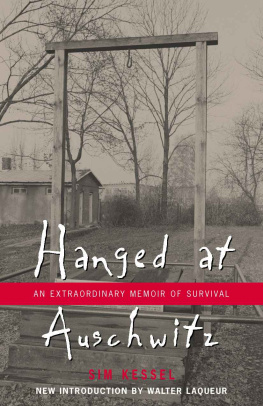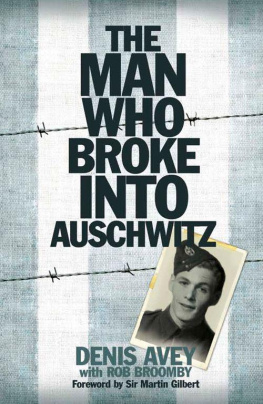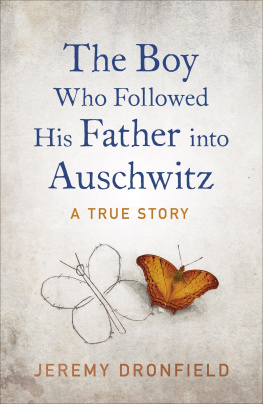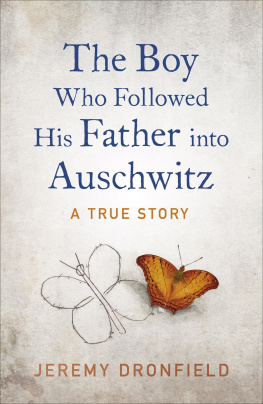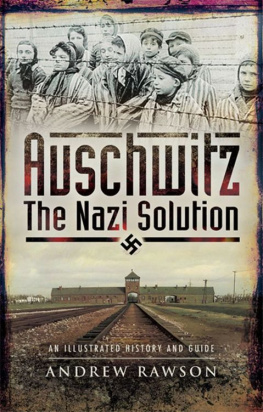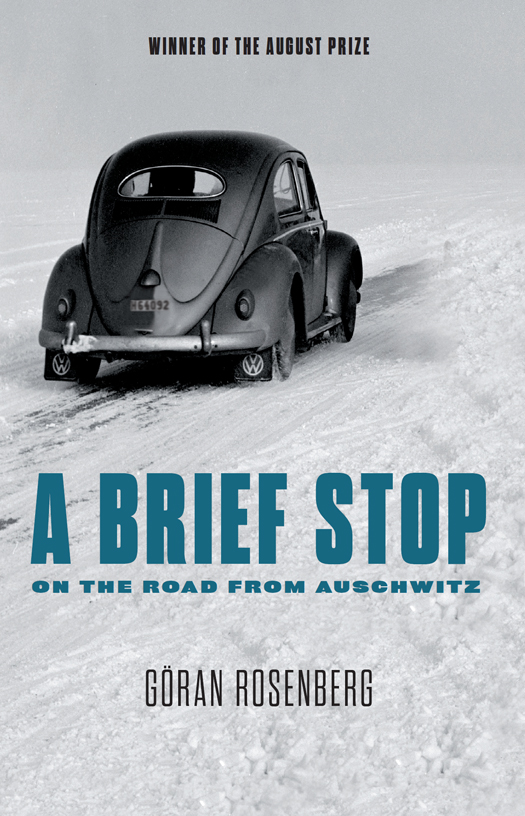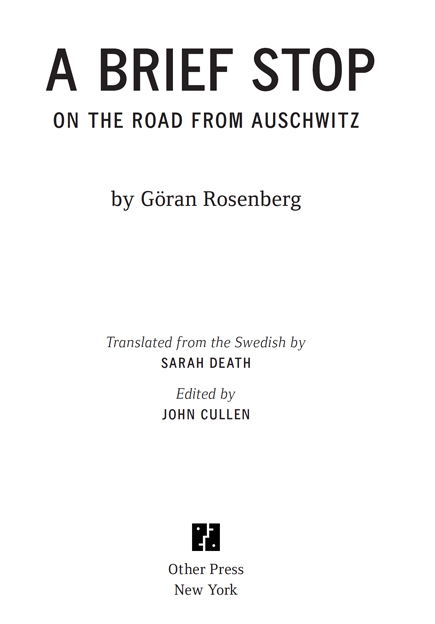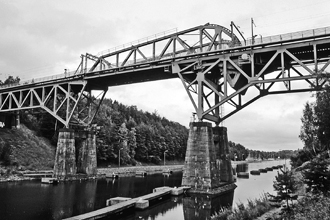Copyright 2012, Gran Rosenberg
Originally published in Swedish as Ett kort uppehll p vgen frn Auschwitz by Albert Bonniers Frlag, Stockholm, in 2012
Translation copyright 2015 by Sarah Death
Published by arrangement with Granta Publications,
12 Addison Avenue, London W 11 4 QR .
All rights reserved.
Production Editor: Yvonne E. Crdenas
All rights reserved. No part of this publication may be reproduced or transmitted in any form or by any means, electronic or mechanical, including photocopying, recording, or by any information storage and retrieval system, without written permission from Other Press LLC, except in the case of brief quotations in reviews for inclusion in a magazine, newspaper, or broadcast. For information write to Other Press LLC, 2 Park Avenue, 24th Floor, New York, NY 10016. Or visit our Web site: www.otherpress.com
The Library of Congress has cataloged the printed edition as follows: Rosenberg, Gran, 1948
[Ett kort uppehll p vgen frn Auschwitz. English]
A brief stop on the road from Auschwitz / by Gran Rosenberg; translated from the Swedish by Sarah Death; edited by John Cullen.
p. cm.
ISBN 978-1-59051-607-2 (alk. paper) ISBN 978-1-59051-608-9
1. Rozenberg, Dawid Family. 2. Holocaust survivors Sweden Biography. 3. Jews Sweden Biography. 4. World War, 19391945 Concentration camps Poland Biography. 5. World War, 19391945 Concentration camps Germany Biography. 6. Auschwitz (Concentration camp) I . Death, Sarah, translator. II . Title.
DS 135. S 89 R 6713 2015
940.5318092 dc23
[ B ]
2014018547
v3.1
Contents
THE PLACE
For a long time I imagined him coming over the Bridge, since the Bridge is the gateway to the Place, and the key to it as well, but of course he cant have come over the Bridge because he must have arrived from the south. You come over the Bridge only when you arrive with the train from the north. Only then does the vertiginous precipice over the Canal open up, and only then do you cross the perilous boundary between home and away. Perhaps the peril is not so much the Canal as the Bridge. The Canals only water, after all, whereas the Bridge is a truly ominous passage, a cold skeleton of riveted steel girders, welded and screwed together in angular arcs that form a pair of bony shoulders rising from four massive stone columns on either side of the drawbridge across the waterway.
Anyone coming by train sees none of this, of course, and may not even be aware that the entire structure is vibrating and shaking beneath the engine and the coaches, or hear the screech of the rails and the echo of the steel girders answering the wheels metallic hammering and scraping, or catch the burnt smell of sparking contacts and cables. Nor can anyone crossing the Bridge by train ever share the terror of crossing it on foot. To cross the Bridge on foot, you first have to make your way through a little copse between the Place and the Canal, then negotiate a narrow, winding set of steps up to a height of twenty-six meters, and after that step out onto a narrow catwalk for pedestrians that runs on one side of the double railroad track, all the way across the water. You can stare straight down into the abyss through the gaps in the catwalks wooden planks, and you can all too easily swing yourself over its all too low metal railing. In the Place, horror stories are constantly circulating about people who did just that, and about how their broken and bloated bodies were fished out afterward, and about what God has to say on the subject. I always keep a tight hold on the inner railing, the one nearest the tracks, to counteract the black, vertiginous pull. Except when a train comes thundering along the track nearest the catwalk and the metallic wind tugs at your clothes and the shuddering wooden planks jolt your feet and youre left balancing between one hell and another. In my nightmares, Im incessantly falling from the Bridge. In my nightmares, I also reach the other side. For on the other side of the Bridge, down an equally narrow and winding set of steps, beyond an equally dark copse, death is waiting, or at least the nameless local gangs against which the gangs on my side of the Bridge fight an endless and lawless war. Making it over the Bridge is no guarantee of survival. The nightmare of getting ambushed and beaten up in enemy territory isnt wholly divorced from reality. The Bridge marks the Places natural boundary, and theres rarely any reason to cross it on your own.
If you come by train from the south, you traverse no such border, just a nondescript panorama of forests and fields that makes it harder to know where the Place begins. Also harder to understand why it is where it is, and why the station where the express trains make their brief stops on their way to and from the world was built just here and not in the town of the same name. All this is best explained by the Bridge, since the station is located here because of the Bridge, and the Place sprang up because of the station, and maybe thats why I like to imagine him coming over the Bridge before he gets off the train at seven in the evening on August 2, 1947, seeking to start his life over again in this particular place, below this particular station.
Is it chance that makes him get off precisely here? No, not more of a chance than anything else on his journey. And presumably less, since the most chanceful aspect of his life is the fact that hes alive. Naturally its only by chance that any of us are alive, but along his road death has been more of a strictly scheduled and predictable stop than it is for most of us, making the fact that hes still alive a bit more unexpected. Besides, he knows very well why hes getting off precisely here and not somewhere else. Hes got the name of the station carefully written down on the piece of paper hes shown the conductor, who has promised to alert him when theyre getting close. And besides all that, A. and S. are waiting for him on the platform as agreed, and in fact a third person, too, whom he at first mistakes for a fellow student from the grammar school in d. Its not him, of course, and its highly improbable that it could be, but since he has passed so many improbabilities along his road, its not that far-fetched to imagine another one or two. At any event, there they are, standing on the platform waiting for him, and they embrace him and help him down the steps with his suitcases and come along to show him the way to the room where hell be lodging, and on that still, light, August evening they tell him everything they know about the Place, where theyve all just arrived and which none of them knows very much about, and they in turn want to know everything about people and events in the place where the man boarded the train, which is where they last met. Theyre all still on a journey, and every place is just a brief halt on the road to somewhere else, and those who are here for the time being do their best to keep themselves posted about those who are somewhere else, because this restless, mobile community is the only community they have. Little by little, each of them will try to make one of these many places his own, and one place after another will gradually separate them, usually for good, and this particular place will eventually do the same. Only one of the men will try to make this particular place his own, and thats the man whos just stepped down from the train.



